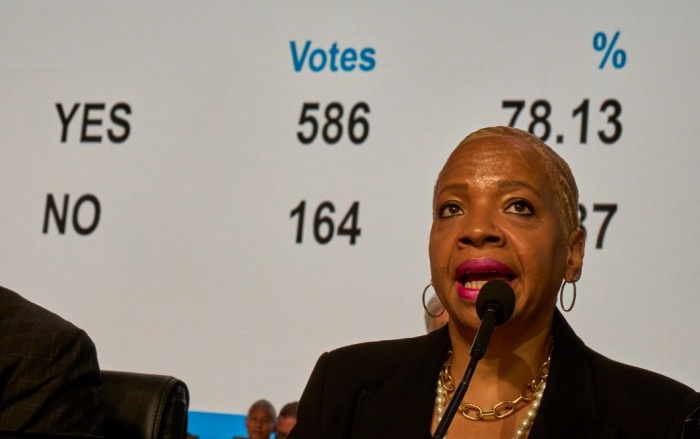UMC bishops denounce Christian nationalism as ideology that ‘defies God’s love’

United Methodist Church bishops have publicly condemned Christian nationalism, claiming that it fundamentally contradicts God's love and prioritizes power over compassion.
In a pastoral letter released last week, Bishop Tracy S. Malone, the president of the UMC Council of Bishops, raised concerns about the increasing polarization and division within communities and nations.
"Nationalism is a political ideology that defies God's love by pitting the interests of one group of people against others," Malone wrote on behalf of the bishops, denouncing both Christian and secular nationalism.
"Christian nationalism demands laws, culture, and public policies be based on a distorted interpretation of the Gospel that elevates power and control over love. These ideologies are in direct contradiction to our Christian faith because our 'love of God is always linked with love of neighbor, a passion for justice and the renewal of life in the world.'"
The bishops said pressures of global crises, such as climate change, economic disparity and global migration, enhance the allure of authoritarian leaders who propagate division.
This environment, Malone said, not only threatens civic engagement but also gives rise to political violence and authoritarian governance practices tinged with racism, misogyny and xenophobia.
The pastoral letter reasserted the denomination's commitment to the Wesleyan tradition, which acknowledges only God's ultimate authority over creation. It called for United Methodists to rely on Scripture, tradition, reason and experience to shape a social conscience that pursues justice and nurtures global relationships.
Earlier this year, delegates at the UMC General Conference voted to change the denomination's rules to allow for the blessing of same-sex unions and the ordination of people in same-sex marriages.
The changes came after more than 7,500 mostly conservative churches left the denomination due to the years-long debate over LGBT issues.
In recent times, "Christian nationalism" has become a common term in mainstream media and among progressive advocacy groups to describe certain conservative Christian groups and individuals.
During a recent multi-panel event moderated by The Christian Post reporter Ian Giatti, retired Lt. Col. Allen West, former chairman of the Texas GOP, suggested that the Christian nationalism discussion has emerged because "the left has created a religion of their own."
"So they have created these things, and if you don't go with it, you don't agree with it, then you're an extremist," he said, making special mention of Politico reporter Heidi Przybyla's comments during an MSNBC panel in February that slapped the "Christian nationalist" label on those who believe rights "don't come from Congress, they don't come from the Supreme Court, they come from God."
Mike Berry, executive director of the Center for Litigation at America First Policy Institute, has said there is no legal definition of Christian nationalism.
"And even if there were a legal definition, I think the term has really taken on a life of its own. It's been used, if you want to say it's been weaponized, I think, by the Left, as a bit of a dog whistle," said Berry.
"Look, the United States, everybody agrees that the United States is not a theocracy. Anyone who studied the founding of our nation knows that we were really, it was a marvel of the world at the time, the way that our founders established our republic."
According to the progressive Baptist Joint Committee for Religious Liberty, Christian nationalism is "a cultural framework that idealizes and advocates a fusion of Christianity with American civic life."
"Christian nationalism contends that America has been and should always be distinctively 'Christian' from top to bottom," the BJC states. "But the 'Christian' in Christian nationalism is more about identity than religion. It carries with it assumptions about nativism, white supremacy, authoritarianism, patriarchy, and militarism."



























